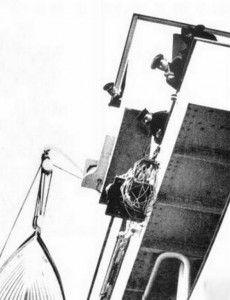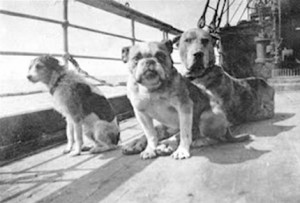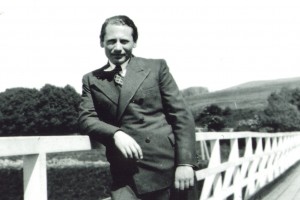His body was never recovered, and no doubt some of the stories of heroism are embellished—if only because the chaos of Titanic’s final hours would prevent an investigative reporter-type analysis.
Yet we know that Captain Edward John Smith—the Titanic’s only captain, and 38-year veteran of the sea—went down with the ship. Reports of the time, now, incredibly, a century ago, have him telling crew to “Be British.” It sounds like something such a man would say.
A man who lived in the waning years of the Victorian era, and who was born just before so many new inventions changed society forever (including photography), is somewhat remote to us in history. There is little we can truly know about him. Grainy photographs don’t do him justice, this flesh-and-blood man who logged 2 million miles for the fabled White Star Line.
In what must be the last photo taken of the Captain, he is leaning out a window on the bridge, watching passengers board. By all accounts, he was the quintessential ship’s captain, dressed in his whites during evening dinners with important guests, and chatting with crew members during the chilly days as Titanic steamed toward a port she would never reach.
A few years ago, I picked up a reproduction of the “Captain E.J. Smith Memorial” booklet, that detailed the unveiling of a statue of the Captain, in 1913. There is one recollection of the man who captained, at various times, the Majestic, the Baltic, the Adriatic, the Olympic…and her even-more-opulent sister-ship, Titanic.
This account comes from Mr. J.E. Hodder Williams:
“We crossed with him on many ships and in many companies, through seas fair and foul, and to us he was, and will ever be, the perfect sea captain. In the little tea parties in his private state-room we learned to know the genial-warm-hearted family man; his face would light as he recounted the little intimacies of his life ashore, as he told of his wife and the troubles she had with the dogs he loved, of his little girl and her delight with the presents he brought her and the parties he had planned for her. You have read that just before he sank to the deeps he rescued a baby. That was ‘our’ Captain Smith, and surely that was his last message to his own ‘Babs’ and her mother.
“He was amazingly informed on every phase of present-day affairs, and that was hardly to be wondered at, for scarcely a well-known man or woman who crossed the Atlantic during the last twenty years but had at sometime sat at his table. He read widely, but men more than books. He was a good listener, on the whole, although he liked to get in a yarn himself now and again, but he had scant patience with bores or people who ‘gushed.’ I have seen him quell both.
“He had lived his whole life on the sea, and—it seems terribly pathetic to write this now—used to laugh at us for talking as if we knew anything of its terrors in these days of floating hotels. He had served his apprenticeship in a rough school, and knew the sea and ships in their uncounted moods. He had an infinite respect—I think that is the right word—for the sea. Absolutely fearless, he had no illusions as to man’s power in the face of the infinite. He would never prophesy an hour ahead. If you asked him about times of arrival, it was always ‘if all goes well.’ I am sure now that he must have had many terrible secrets of narrowly averted tragedies locked away behind those sailor eyes of his.”


